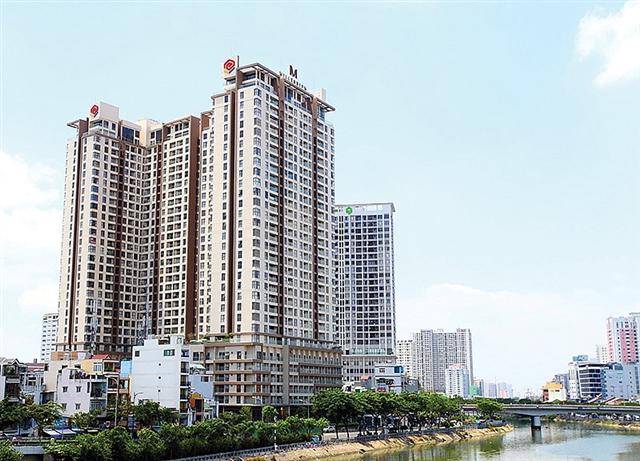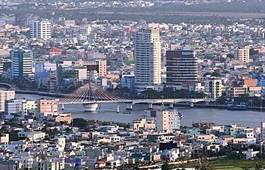Local investors hurry to acquire real estate land
Local investors hurry to acquire real estate land
As the pandemic prevents international investors from entering Vietnam to complete deals, domestic investors are actively taking the opportunity to expand their portfolios through mergers and acquisitions (M&A) in residential development projects.

Local investors hurry to acquire real estate land, Photo Le Toan
|
Many real estate developers are mobilising trillions of VND to acquire land funds, preparing for their future development strategy. As such, Nam Long Group is actively expanding its land fund, even though it already holds around 700 hectares nationwide.
According to Nguyen Xuan Quang, chairman of Board of Directors at Nam Long, the expansion will ensure the group’s long-term sustainable development strategy.
Nam Long has reserved around VND2 trillion ($86.9 million) a year to acquire land. “We are concentrating on land expansion and mobilised all capital sources for the purpose. We are seizing the opportunity as many other developers are restructuring their investment portfolios and are being forced to sell properties,” Quang said.
Nam Long Group’s aims are large-scale land plots located in satellite cities or located at the gates of the key economic zones nationwide. In addition, the company is processing new land plots in Hanoi and Ho Chi Minh City at a total of 34ha within the year.
Meanwhile, Danh Khoi Group is trying to acquire a land plot in Danang and has just signed a contract with Phat Dat Corporation to co-develop a complex in Binh Duong.
Even though An Gia Investment Corporation has staged its initial public offering less than a year ago, it is expressing ambitions to expand its current land fund.
In 2020, An Gia plans to reserve VND3-5 trillion ($130-215 million) to acquire land plots. Apart from the key market in Ho Chi Minh City, An Gia is expanding to neighbouring provinces such as Dong Nai, Long An, Ba Ria-Vung Tau, and Binh Duong.
Elsewhere, many investors are joining the game, including Phat Dat Real Estate JSC with the acquisition of 99 per cent in Ben Thanh Long Hai Corporation and Hung Thinh Group, with more than 1,000ha of land located in Lam Dong province to build an eco-tourism complex.
There were also many successful deals in the first half of the year – however, the details of many were not released due to confidentiality.
Nguyen Thi Thanh Huong, general director of Dai Phuc Land, said every developer is rushing to acquire more land to not miss the chance of creating good projects at a fair price.
“This is a win-win for both buyers and sellers. The sellers can restructure their portfolios to concentrate on core projects, while buyers can acquire a good track record for projects,” Huong said. “The real estate sector needs long-term investment of at least 5-10 years. Therefore, having a good land fund is the most important factor, especially as the land area has been running out gradually and compensation expenses are on the rise.” Huong added that developers have to reserve large cash flows for acquiring land funds in the long term and proactively implement plans. to ultimately be more competitive later on.
Dang Van Phuc, deputy general director of Saigon Real Estate JSC, said that M&A is one of the core strategies of his company. During the coronavirus peak in March in Vietnam, the company acquired 20 per cent of the shares in a residential project in Ho Chi Minh City from RESCO 9 JSC.
“We have been taking advantage of our strengths to find new projects and conduct M&A deals to accumulate land funds as our medium- and long-term development strategy. Currently, we are actively compensating the remaining land of the Gem Premium project in Thu Duc district, Ho Chi Minh City to transact it to Dat Xanh Group,” said Phuc.
Meanwhile, Luong Tri Thin, chairman of the management board of Dat Xanh, said that COVID-19 on the one hand has had a strong negative impact on the real estate market but on another, it offers new chances. “It is high time to expand portfolios via M&A. I have received around 200 offers from other developers, including many really good deals,” Thin said.
Dat Xanh’s current target is to transfer small projects and concentrate on more efficient large ones, and the company is actively seeking land for this.
A successful deal depends on many factors, including the transparency of the market and the partnership, the expected prices of the project, the process, legal procedures, and vision from both sides.
Huong from Dai Phuc Land explained that the acquisition of land plots is only a game for developers with good cash flows.
Moreover, successful buyers will also keep large cash reserves in their storage as they can never know when those projects will yield benefits.
Another factor added to the risk for buyers is the difficulty in having enough grasp on legal procedures to implement the projects, which can slow the whole process down.
“Large land banks are an advantage, but if the buyers cannot develop their projects well after acquisition, this advantage will turn into a burden of inventory and waste capital,” Huong warned.
The transparency of the Vietnamese market is still sub par, causing delays and concerns from both sides to finish any deals targeted. A recent report from JLL Vietnam revealed that as Vietnam is an emerging market, M&A ventures are still very challenging.
Developers, meanwhile, express that it is necessary to professionalise activities of all sectors in the real estate field from developers and investors to trading centres as well.
Management authorities also have to improve their market database to meet management needs from central to grassroots levels.
In addition, according to SB Law’s Nguyen Thanh Ha, M&A deals now have to take into account different laws including those on enterprises, investment, competition, environment, land, and asset purchasing, as well as many other relevant decrees.
























